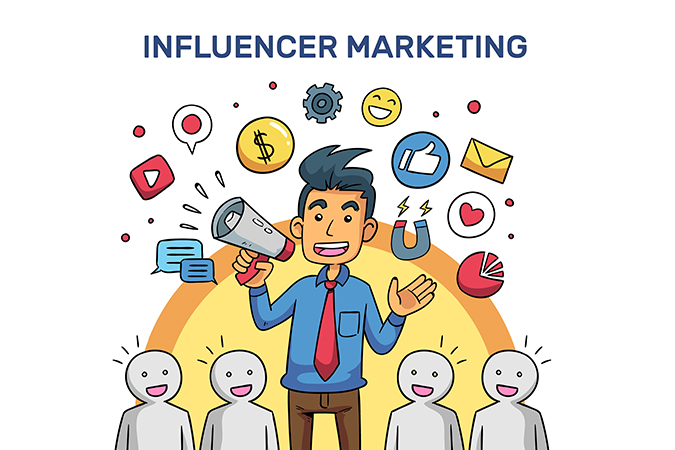In today’s digital age, where social media dominates our daily lives, influencer marketing has emerged as a powerful strategy for brands to connect with their target audiences in authentic and engaging ways. This form of marketing leverages the influence of individuals with large followings on social media platforms to promote products and services, tapping into their credibility and rapport with their audience. Let’s explore how influencer marketing has revolutionized the digital marketing landscape and why it continues to be a vital strategy for businesses worldwide.

Understanding Influencer Marketing
Influencer marketing involves collaborating with individuals who have a strong online presence and a loyal following in a particular niche or industry. These influencers can be celebrities, industry experts, or even everyday people who have cultivated a significant following through their content and engagement on platforms like Instagram, YouTube, TikTok, and more recently, platforms like Clubhouse and Snapchat. The key aspect of influencer marketing lies in the influencer’s ability to sway the purchasing decisions of their audience through their authenticity and authority.
Why Influencer Marketing Works
Authenticity and Trust: Unlike traditional advertising, which can often feel impersonal or overly promotional, influencer marketing thrives on authenticity. Influencers build trust with their audience by sharing genuine experiences and recommendations, making their endorsements more credible and impactful.Targeted Reach: Influencers typically have followers who align closely with their interests, demographics, and behaviors. This targeted approach allows brands to reach specific segments of their audience more effectively than broader marketing strategies.Content Diversity: Collaborating with influencers enables brands to create diverse and engaging content formats, including product reviews, tutorials, unboxings, and behind-the-scenes glimpses. This variety helps in capturing different stages of the consumer journey and maintaining audience interest over time.SEO and Brand Awareness: Influencer collaborations can significantly boost a brand’s SEO efforts by generating backlinks and mentions across social media and other digital platforms. Additionally, working with influencers can increase brand visibility and awareness among new audiences who may not have been reached through traditional advertising channels.

Types of Influencer Collaborations
Influencer marketing offers a range of collaboration options, each suited to different campaign goals and budget considerations:
- Sponsored Content: Brands pay influencers to create and share content that promotes their products or services. This can include Instagram posts, YouTube videos, sponsored blog posts, or even live-streamed events.
- Brand Ambassadors: Long-term partnerships where influencers become brand advocates, promoting products over an extended period. This fosters deeper connections with their audience and builds sustained brand loyalty.
- Affiliate Marketing: Influencers earn commissions for driving sales or leads through unique tracking links or discount codes, incentivizing them to actively promote products to their followers.
- Event Collaborations: Inviting influencers to exclusive events or product launches can generate buzz and excitement, amplifying the reach and impact of the brand message.
Measuring Influencer Marketing Success
Effectively measuring the ROI of influencer marketing campaigns is crucial for optimizing strategies and demonstrating value. Key performance indicators (KPIs) may include:
- Engagement Metrics: Likes, comments, shares, and video views indicate the level of audience interaction with influencer content.
- Reach and Impressions: Metrics that quantify the number of unique users exposed to influencer posts help gauge campaign visibility.
- Conversion Rates: Tracking the number of sales, sign-ups, or downloads directly attributed to influencer-driven traffic provides insights into campaign effectiveness.
- Brand Sentiment: Monitoring social media sentiment and b
- rand mentions post-campaign can gauge audience perception and brand affinity.
Challenges and Considerations
While influencer marketing offers numerous benefits, it’s not without its challenges:
- Authenticity Concerns: Maintaining authenticity can be challenging when influencers endorse multiple products or services simultaneously, risking audience trust.
- Finding the Right Fit: Identifying influencers whose values align with the brand’s identity and target audience requires careful research and vetting.
- Regulatory Compliance: Adherence to advertising regulations, such as FTC guidelines in the United States, ensures transparency in sponsored content disclosures.
Future Trends in Influencer Marketing

Looking ahead, influencer marketing is expected to continue evolving with advancements in technology and changing consumer behaviors. Trends such as nano-influencers (micro-influencers with smaller but highly engaged audiences), AI-driven influencer selection, and the rise of niche platforms are shaping the future landscape of influencer collaborations.
Conclusion
In conclusion, influencer marketing has cemented its place as a cornerstone of digital marketing strategies, offering brands unparalleled opportunities to connect authentically with consumers and drive meaningful engagement. By harnessing the power of influence, businesses can amplify their reach, enhance brand visibility, and ultimately achieve their marketing objectives in an increasingly competitive digital marketplace.
Incorporating influencer marketing into your digital strategy requires a thoughtful approach, from identifying the right influencers to measuring campaign success. Embrace the potential of influencers to not only promote products but also to build lasting relationships with your audience, fostering loyalty and advocacy in the digital age.



